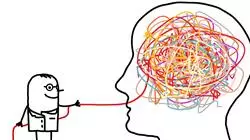University certificate
The world's largest faculty of medicine”
Why study at TECH?
Update your knowledge with the latest advances in Anxiety-Related Disorders with a high-quality Postgraduate diploma fully compatible with your professional and working life"

Anxiety-related disorders are sometimes unwittingly considered "second tier" when compared to others such as bipolar disorder or psychotic spectrum disorders that used to constitute what was called heavy psychiatry. Add to that other disorders that are being heavily researched, such as attention deficit disorder (ADHD) and borderline disorder; only obsessive-compulsive disorder (OCD) and post-traumatic stress disorder, would be close to a first line of intervention.
The reality is that without entering into comparisons of severity, which would be out of the scientific context, a large part of these disorders are more frequent and therefore a greater number of people are affected.
It is considered that lately there is a certain tendency, even in psychiatrists, to focus psychotherapeutic and sometimes pharmacological treatments on mitigating anxiety or its symptomatological equivalents. This approach is losing sight of the fact that the fundamental issue is to treat nosological entities. It is possible that it may be influenced by the rapid satisfaction of the patient when they perceive that their symptoms are improving.
Another important aspect is that in these disorders the population tends to link the psychiatrist with drugs or other biological treatments, and psychotherapy with other mental health professions, so it is an important task of the psychiatric profession to show the user that the psychiatrist can, and should, perform psychotherapeutic treatments.
This program includes the latest updates on differential diagnosis, clinical and therapeutic management of anxiety-related disorders. It presents a theoretical and practical learning system based on theoretical models and clinical cases, to facilitate learning and clinical application.
It also presents the theoretical aspects from the presentation of clinical cases by professionals in the field of psychiatry, which facilitates learning in a simple and educational way.
It favors learning through the elaboration of theoretical-practical models that facilitate the integration of the clinical aspects of psychiatry that facilitate the integration of clinical and therapeutic aspects.
With this Postgraduate diploma you will be able to combine high-intensity training with your professional and personal life, achieving your goals in a simple and real way"
This Postgraduate diploma in Anxiety Disorders containss the most complete and up-to-date scientific program on the market. Its most notable features are:
- The latest technology in online teaching software
- A highly visual teaching system, supported by graphic and schematic contents that are easy to assimilate and understand
- Practical cases presented by practising experts
- State-of-the-art interactive video systems
- Teaching supported by telepractice
- Continuous updating and recycling systems
- Autonomous learning: full compatibility with other occupations
- Practical exercises for self-evaluation and learning verification
- Support groups and educational synergies: questions to the expert, debate and knowledge forums
- Communication with the teacher and individual reflection work
- Content that is accessible from any fixed or portable device with an Internet connection
- Supplementary documentation databases are permanently available, even after the course
The learning in this Postgraduate diploma is developed through the most developed teaching methods in online teaching to guarantee that your efforts produce the best results possible”
Our teaching staff is made up of professionals from different fields related to this specialty. In this way, we ensure that we provide you with the training update we are aiming for. A multidisciplinary team of professionals trained and experienced in different environments, who will cover the theoretical knowledge in an efficient way, but, above all, will bring the practical knowledge from their own experience to the course: one of the differential qualities of this course.
This mastery of the subject is complemented by the effectiveness of the methodology used in the design of this Postgraduate diploma in Anxiety Disorders. Developed by a multidisciplinary team of experts, it integrates the latest advances in educational technology. In this way, you will be able to study with a range of comfortable and versatile multimedia tools that will give you the operability you need for your specialization.
The design of this program is based on Problem-Based Learning: an approach that conceives learning as a highly practical process. To achieve this remotely, TECH will use telepractice: with the help of an innovative interactive video system, and learning from an expert you will be able to acquire the knowledge as if you were facing the scenario you are learning at that moment. A concept that will allow you to integrate and fix learning in a more realistic and permanent way.
A highly qualified program that will allow you to act with solvency from the moment of diagnosis to the treatment programming and its development”

A specialization created and directed by professional experts in Psychiatry, Psychology and Anxiety Disorders, which make this Postgraduate Diploma a unique opportunity for professional growth”
Syllabus
The contents of this Postgraduate diploma have been developed by the different experts involved in the program, with a clear purpose: to ensure that our students acquire each and every one of the necessary skills to become true experts in this field.
A complete and well-structured program will take you to the highest standards of quality and success.

A comprehensive teaching program, structured in well-developed teaching units, oriented towards learning that is compatible with your personal and professional life”
Module 1. Introduction to Anxiety Disorders: Diagnosis and Treatment
1.1. History of Anxiety Disorders
1.2. Concept of Anxiety and Distress
1.2.1 The Normal Vs. The Pathological
1.3. Classification of Anxiety Disorders
1.4. Neuronal Circuits of Anxiety and Fear
1.5. Epidemiology
1.6. Biological Etiopathogenic Factors
1.6.1 Evolutionary Approach to Anxiety
1.7. Psychological Etiopathogenic Factors
1.7.1 Cognitive-Behavioral Approach to Anxiety
1.7.2 Psychodynamic Approach to Anxiety
1.8. Sociocultural Etiopathogenic Factors
1.9. Psychiatrist's Roles in Pharmacotherapy and Other Biological Treatments
1.10. Psychiatrist's Roles in Psychotherapeutic Treatments
1.11. Psychiatrist's Functions in Social Treatments
Module 2. Social Anxiety Disorder
2.1. Phenomenology of Social Phobia
2.2. Pathogenesis of Social Phobia
2.3. Clinical Symptomatology and Psychopathological Exploration
2.4. Explorations and Complementary Tests
2.5. Current Diagnostic Criteria and Differential Diagnosis
2.6. Evolution and Prognosis
2.7. Medical Treatment
2.8. Psychotherapeutic treatment
2.9. Social interventions
Module 3. Generalized Anxiety Disorder
3.1. Phenomenology of Generalized Anxiety Disorder
3.2. Pathogenesis of Generalized Anxiety Disorder
3.3. Clinical Symptomatology and Psychopathological Examination in Generalized Anxiety Disorder
3.4. Explorations and Complementary Tests
3.5. Current Diagnostic Criteria and Differential Diagnosis
3.6. Evolution and Prognosis
3.7. Medical Treatment
3.8. Psychotherapeutic treatment
3.9. Social interventions
Module 4. Diagnosis and Treatment of Anxiety Disorders in Special Populations
4.1. Anxiety in Childhood and Adolescence
4.2. Separation Anxiety Disorder. Generalized Anxiety Disorder
4.3. Social Phobia
4.4. Obsessive-Compulsive Disorder in Childhood and Adolescence
4.5. Reactive Attachment Disorder Disinhibited Social Relationship Disorder
4.6. Post-Traumatic Stress Disorder
4.7. Clinical Anxiety Disorders in the Elderly
4.8. Diagnosis of Anxiety Disorders in the Elderly
4.9. Pharmacological Treatment.
4.10. Psychotherapeutic Treatments and Social Interventions

A unique, key, and decisive program to boost your professional development”
Postgraduate Diploma in Anxiety Disorders
According to statistics presented by the World Health Organization, about 264 million people worldwide suffer from anxiety disorders, standing out as one of the most affected psychiatric pathologies nowadays. This situation evidences the great need that exists in the world medical panorama for health professionals specialized in the care of this type of disorders. Understanding the important role of academic updating as a fundamental tool in the training of doctors of possible insertion in this field of development, in TECH Global University we have designed our Postgraduate Diploma program in Anxiety Disorder. In this postgraduate course we will deepen in the new tools implemented for the improvement of psychotherapeutic treatment processes applied to patients with generalized anxiety disorder. Likewise, it will deepen in the modernization of the following topics: the knowledge of the different alternatives of psychotherapeutic and pharmacological intervention in the attention to cases of anxiety disorder affecting elderly patients; and the identification of the different ways of approach in the management of cases of separation anxiety disorder.
Study Anxiety Disorder Online
Due to the nature of its symptomatological manifestations, anxiety disorders and their diverse possibilities of intervention and treatment present great challenges for modern medical sciences, standing out as a field of great demand for expert professionals in the field. In our Postgraduate Diploma program you will approach anxiety disorders from the understanding of the latest advances in their study and in the development of new treatment alternatives for this pathological condition. Likewise, in this postgraduate program you will deepen in the updating of the following concepts: the identification of the biological, psychological and sociocultural etiopathogenic factors that contribute to the appearance of cases of anxiety disorders; and the knowledge of the different complementary tests used in the diagnosis and detection of cases of social anxiety disorder.







